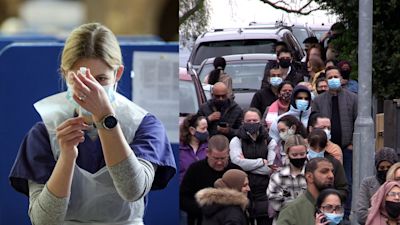Covid vaccines 'almost certainly less effective' at reducing transmission of Indian variant

ITV News Correspondent Jonathan Brown has the latest on the plan to continue with Monday's easing of restrictions, despite concerns
Covid-19 vaccines are "almost certainly less effective" at reducing transmission of the Indian variant, the head of the Joint Committee on Vaccination and Immunisation (JCVI) has warned.
Professor Anthony Harnden, deputy chair of the group which advises the government on vaccines, said: "The vaccines may be less effective against mild disease but we don’t think they’re less effective against severe disease."
He told BBC Radio 4’s Today programme: "But in combination with being less effective against mild disease, they’re almost certainly less effective against transmission."
His comments come as the Prime Minister admitted the Indian variant could "pose serious disruption" to his aim of full lockdown easing in England on June 21.
Cases of the new strain have more than doubled in a week (from 520 to 1,313), with Public Health England "rapidly" investigating.
At a press briefing on Friday, Boris Johnson said if the Indian variant proved to be "significantly more transmissible" than other strains then "we’re likely to face some hard choices".
Already the Scientific Advisory Group for emergencies (Sage) has said there is a "realistic possibility" the variant could be as much as "50% more transmissible" than the Kent strain, the current dominant strain in the UK.
Minutes of the group's meeting said that it is "highly likely that this variant is more transmissible than B.1.1.7 (high confidence), and it is a realistic possibility that it is as much as 50% more transmissible".
Coronavirus: What you need to know - listen to the latest episode
The government has introduced surge testing in a number of places to try and combat the rise in cases of the variant.
Another move is the acceleration of the the vaccine roll-out for second doses amond the over-50s and clinically vulnerable people.
Professor Anthony Harnden defended the approach of bringing forward second jabs rather than speeding up the roll-out to younger people.
He told BBC Radio 4’s Today programme that targeting more vulnerable people with full immunity is a "better strategy".
He said: "The reason we think this is if we immunise 18-29 year olds, for instance, in these areas we’ll be taking vaccines from somebody else in the country.
"The vaccines may be less effective against transmission and immunity takes a number of weeks to develop, so it’s not a very good strategy for preventing transmission, what we want is to prevent disease.
"From a vaccination strategy it just won’t help mass-vaccinating a number of young people at the expense of older people who haven’t been vaccinated."
Despite the rising cases of the variant, Monday's easing of lockdown will go ahead as planned in England - with the other nations also relaxing rules next week.
Easing lockdown on Monday still 'the right thing to do' despite Indian variant fears
Health minister Edward Argar told ITV News the plan to relax the rules was continuing "on the basis of the data" and was still "the right thing" to do.
Pushed on whether June 21 date is likely to still be the date people in England could look forward to for the full ending of lockdown, Mr Argar said plans "could" be disrupted but it was "too early to say."
"At the moment there is no evidence to suggest that the Indian variant evades vaccines, nor is there any evidence to suggest that it leads to more severe illness or tragically deaths.
"What there is initial evidence that it's more transmissible than other variants - but we don't know the extent of extra transmissibility there is."
India was added to the UK's 'red list' of countries on April 23 - requiring passengers arriving from the country to enter in to hotel quarantine for 10 days.
ITV News' Political Editor Robert Peston has suggested the government made a "late decision" on imposing travel restrictions for arrivals from India.
The Covid situation in India had been worsening for weeks in advance of a decision being made on strengthening travel restrictions.